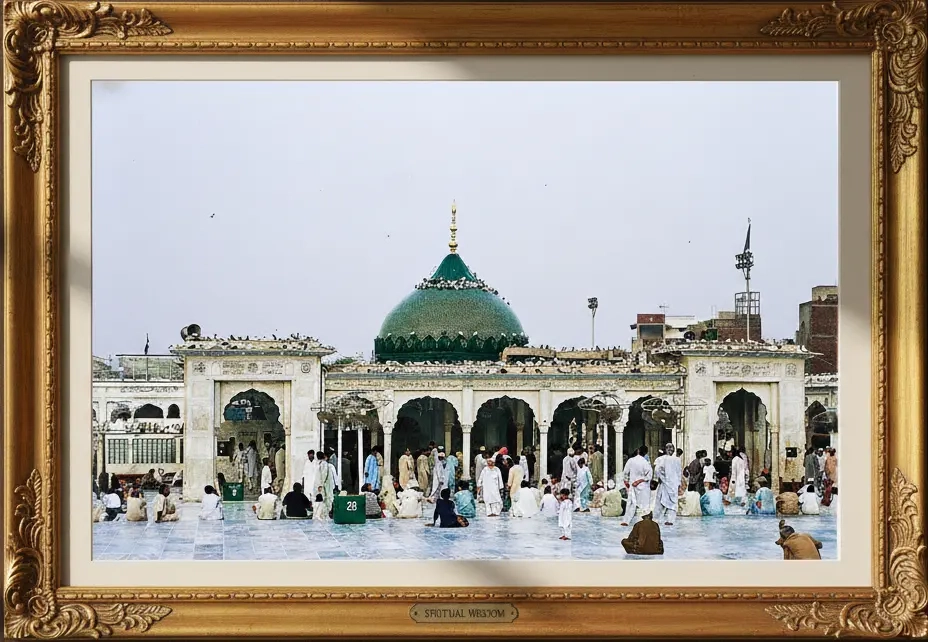A Tribute to Data Ganj Bakhsh

Senior analyst and columnist Dr. Safdar Mahmood, in his latest column titled “Two Pages from a Spiritual Book,” has shifted his focus from current politics to the esteemed personality of Hazrat Data Ganj Bakhsh. He writes that the thought occurred to him to write about Hazrat Ali bin Usman Hujwiri, popularly known as Data Ganj Bakhsh, instead of joining the procession of mourning over the state of affairs and politics. This is particularly relevant as his annual Urs (death anniversary observation) is currently underway, and a “sea of light” is flowing.
This sea of light is for those eyes that are “insightful”—that see and remain awake. When eyes are awake and insightful, the materialistic, worldly veils begin to lift.
A Spiritual Revelation in Lahore
With this thought, a certain English book came to his mind, which he had read some time ago. For him, the book was not only informative but also soul-stirring. Informative because the author made a unique and thought-provoking revelation.
The author, Masoodul Hassan, writes in his book, “Hazrat Data Ganj Bakhsh, Spiritual Biography,” that he came to Lahore in 1930 and rented a flat near Data Darbar. He used to visit the shrine several times a day. It was there that he met Allama Iqbal (R.A.), who would arrive long before the Fajr prayer (at the time of Tahajjud) and return after offering Fajr.
Masoodul Hassan claims that Allama Iqbal showed him the Allahabad Address before presenting it at the Muslim League session and told him that the idea for a separate homeland for Muslims came to him while praying at Data Darbar (Page 3).
The book was published many decades ago and is likely out of print now.
The Command: ‘Imprison Your Senses’
The author, Masoodul Hassan, further relates that while seeking guidance for meditation at the Darbar, he felt as if Data Sahib was instructing him to keep fasts. He continued visiting the shrine for spiritual guidance.
One night, Hazrat Ali bin Usman Hujwiri (R.A.) appeared in his dream and commanded: “Imprison your senses.” Masoodul Hassan could not immediately grasp the meaning. However, one day, while deeply studying Data Sahib’s masterpiece, Kashf al-Mahjub (The Unveiling of the Veiled), the meaning suddenly dawned on him.
In Kashf al-Mahjub, Data Sahib writes that he was blessed with a vision of the Holy Prophet Muhammad (P.B.U.H.) in a dream. When he sought guidance, the Prophet (P.B.U.H.) commanded: “Imprison thy tongue and thy senses.”
Data Sahib explained that abstaining from food and drink is easy, but it is obligatory to avoid worthless desires and immoral actions. Reading this, Masoodul Hassan finally understood the true import of Data Sahib’s command.
The Revolution of the Mind
Masoodul Hassan was an M.A. at a time when the number of university graduates was small. He later joined government service. He writes that, like most highly educated individuals, he did not fully believe in spiritual occurrences, experiences, and miracles.
However, after experiencing that dream and conducting a deep study of Kashf al-Mahjub, a revolution occurred within him. He realized the truth that our thoughts and our minds are not the only means of understanding conversations and affairs. There is a supernatural medium beyond our earthly comprehension.
This led him to believe that when Allama Iqbal wrote the famous couplet, “There are worlds beyond the stars” (ستاروں سے آگے جہاں اور بھی ہیں), he must have had a similar spiritual experience.
The Path of the Seeker
Masoodul Hassan writes that the path to finding Allah Almighty is not a ready-made one. A person stumbles and falters on this journey. Nevertheless, perseverance, steadfastness, and the desire to find the True Creator are essential.
It is necessary to purify the mind and heart of all base desires. Imprisoning one’s thoughts and senses is the essence of this process. As a result, the conscience becomes illuminated and acts as a constant WARNing guide. If a person listens to the voice of the conscience and acts upon it, material senses and desires are suppressed, and the individual begins their spiritual journey.
The spiritual path is an endless journey, allowing one to reach heights beyond imagination.
The Unveiled Truths of Life
During one session of meditation, Masoodul Hassan felt as if he was ascending through stages, reaching a point where the concept of Time and Space does not exist. He was told that now he could seek guidance from his Lord.
- Question: “What is Life?”
- Answer: Life has two aspects: Physical and Spiritual. Imagine a person as a dynamo that generates life. When, by the command of Allah, the dynamo stops running, life ceases. Spiritual life is far superior and beyond physical life. Man knows but is unable to comprehend; he lacks the true understanding of life and death.
- Question: “What is the Principle of Reward and Punishment?”
- Answer: Reward and punishment exist both in this world and the next. The invisible courts of Allah are constantly at work. Man is perpetually on a journey of TRIAL and testing. Some rewards and some punishments are being dispensed in this world, of which man remains unaware. The system of reward and punishment in the next world cannot be grasped by the human mind.
- Question: “What is the Purpose of Life?”
- Answer: To know that Allah is the Sole Sovereign, Owner, and Creator of this universe. When you are alive, you are an Agent of Allah. Therefore, it is mandatory for you to live in the way your True Creator and Lord desires. Every thought must be correct, every action right, and every step taken on the right path.
As an Agent or deputy of Allah, every person can establish a relationship (an Equation) with their Lord. This Equation is called Iman (Faith). If a person does everything on behalf of Allah, their faith is strengthened. The expectation for reward must only be from the Lord.
The spiritual message concluded with these words impressed upon his mind:
The one who loves their Lord will receive love in return.
The one who trusts Allah Almighty will be rewarded accordingly.
And the one who seeks to find their Lord will succeed in their purpose and attain the Creator.

